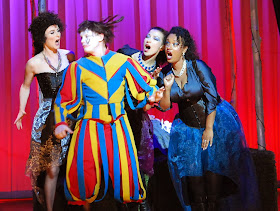Athenaeum Theatre
Thursday 6th November, 2014
When the performing arm of The Melbourne Opera
Studio, Gertrude Opera, presented their fully staged half-length version of The Magic Flute, I was surprisingly
taken aback. Here I was in the intimate clutches of the historic Athenaeum
Theatre, gobsmacked by the journey in time it swept me into. The choice of
venue and the brooding, carnival-like period atmosphere tricked me into
imagining I was plonked into Mozart’s midst as he himself conducted his last
opera, a fairy-tale of sorts championing the forces of good over evil, reason
over revenge and the just rewards of perseverance, at the Freihaus-Theater auf
der Wieden, a suburban Viennese theatre where the work premiered in 1791.
 |
| Belinda Prakhoff, Damien Noyce, Rada Tochalna and Karen Van Spall |
Artistic director Linda Thompson achieved much
with her creative team and effervescent group of predominantly young performers
and guest professional artists, putting a smile of disbelief on my face as The Magic Flute entertained. Running
just under 90 minutes without interval with swathes of recitative omitted, many
arias reduced in length, emphasising the magical and fantastical minus the
Masonic symbolism and its ceremonial choruses, the troupe performed and sang
admirably and clearly to a delightful English libretto.
Even
the musicians felt directed into the production. As patrons took their seats,
the performance almost unknowingly got underway with a sense of invitation and
informality as the seven musicians of the Magic Chamber Orchestra played a charming
orchestral piece on the stage, appropriately a light and airy take on the opera's glorious
overture. When they were done they positioned themselves in the pit and
remained there for the performance, making Mozart's music emanate warmly under
conductor Warwick Stengards' stewardship. Tempi wobbled from time to time with
attempts to reign in vocal activity on the stage but clean, skilled playing was
evident, especially from the honey-toned flute of Derek Jones and Pamela
Christie's stealth at the piano.
In its plump simplicity, set design (simply attributed to Gertrude Opera), incorporated symmetry, height, side-stage steps and a central, hinged platform supporting four "tree" posts slung with fairy lights which illuminated when help seemed at hand or at moments of celebration. Jason Bovaird's delicious lighting design, though executed with occasional opening night mishap, cast a vivid palette of colour on the performance, drenching Amelia Carroll's costumes of period-inspired quirkiness, Gothic-darkness and showbiz glitter. The entire concoction presented Mozart's singspiel in a most pantomime-like manner.
In its plump simplicity, set design (simply attributed to Gertrude Opera), incorporated symmetry, height, side-stage steps and a central, hinged platform supporting four "tree" posts slung with fairy lights which illuminated when help seemed at hand or at moments of celebration. Jason Bovaird's delicious lighting design, though executed with occasional opening night mishap, cast a vivid palette of colour on the performance, drenching Amelia Carroll's costumes of period-inspired quirkiness, Gothic-darkness and showbiz glitter. The entire concoction presented Mozart's singspiel in a most pantomime-like manner.
The young, well-rehearsed cast, at times overcoming some stiffness in delivery, engaged with positive energy, keeping the momentum alive and earning the experience to forge stage-building dreams.
 |
| Juan Enrique Guzman and Alexandra Ioan |
Juan Enrique Guzman displayed praiseworthy
stamina as his expansive, warm-voiced Tamino undertook his quest with
seriousness as he "played" the magic flute with impressive
believability. Alexandra Ioan, pure and rich-toned as Tamino’s promised wife
Pamina, gilded the stage with strong emotive phrasing. As the evil Queen of the
Night, Joelene Griffith channelled her vocal strength, as if through a pipette,
to slither the air with cold rage. Playing the knock-about, happy-go-lucky bird
catcher Papageno, Eugene Raggio, with an at-ease comfort, was happily awarded
his prize-catch lovebird, Papagena, cheerily and squeakily brought to life by
Alissa Andraski. The pair’s final duet especially tickled the funny bone as
they dreamed of a life together with many "Papageni" while unfolding
a concertina-cut-out of kids.
Projecting with a solid appealing voice, Damien Noyce menaced with risk-taking, hyperactive acrobatics as a harlequin-like and low-life Monostatos. Guest professional artist David Gould added thunderous vocal bass and wisdom as he starred from an offstage balconette, commanding in the role of Sarastro, preacher of the way to enlightenment.
Projecting with a solid appealing voice, Damien Noyce menaced with risk-taking, hyperactive acrobatics as a harlequin-like and low-life Monostatos. Guest professional artist David Gould added thunderous vocal bass and wisdom as he starred from an offstage balconette, commanding in the role of Sarastro, preacher of the way to enlightenment.
 |
| Eugene Raggio and Alissa Andraski |
Rada Tochalna, Karen Van Spall and Belinda
Prakhoff swooned and paraded as the three Ladies to the Queen of the Night and
invigorating the evening with multiple synchronised scooter appearances the
three Spirits, Tamzyn Alexander, Alexandra Lidgerwood and Rhiannon Stevens, amused
as a trio of scraggy blonde-wigged golden girls, clearly having fun while
singing with heavenly-voiced lightness.
Presented here was a
refreshingly entertaining kind of opera that
reflects the energy and aspirations of our young crusaders on an operatic
platform at a grassroots level in a production that impressively packages
Mozart’s work for a place and time to suit many an occasion.
Production photographs courtesy of Gertrude Opera

